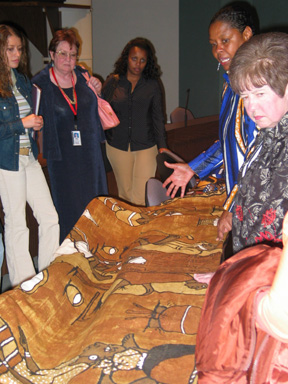 |
Valda Boyd Ford, second from right in an original Ghanian ensemble, shows a “mudcloth” bed spread. |
And one she’ll never forget.
Ford sat in the sultry West African refugee camp earlier this year listening to a mother serenely explain the scar above her left eye. A lion.husband attacked.nearly killed.
She listened in disbelief as the woman described the attack and the sudden decision to sacrifice her infant to save the entire family.
“They have to do the kind of things we would never even consider to live,” Ford said.
It was one of several lessons learned from her eight-week trip to the Buduburam Refugee Camp, the largest camp in Ghana, with roughly 42,000 people crowded on 140 acres.
Ford, director of UNMC’s Community and Multicultural Affairs, traveled to the 15-year-old camp to work with Unite for Sight, an organization dedicated to health promotion and disease prevention. On Monday, she shared her experiences, photos and handmade items from Ghana with the UNMC community during a noon forum.
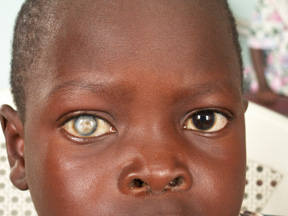 |
Benjamin, 7, is blind from the measles. |
The more than 1,000 photos Ford took show smiles on the faces of a people who have faced unfathomable atrocities, suffer from a high incident of preventable blindness and face harsh living conditions, even at the camp.
Imagine putting the entire population of Bellevue into 20 blocks, Ford said, and having no running water or electricity and only 15 pay toilets. Water, from only two wells on camp, cost 20 cents a bucket or about $2 a day for a family of four.
As refugees, they were given a safe haven, Ford said, but had to save enough money to buy a house in the camp. As a result, many slept outdoors for months. Those fortunate to have a one- or two-room shack usually had only one mattress and no furniture. Children, who may or may not attend school, played games with, frequently, their only pair of shoes and pedaled goods for pennies. The women often were seen carrying heavy loads on their heads and backs, while men were more likely to be in charge of nongovernmental organizations (NGOs).
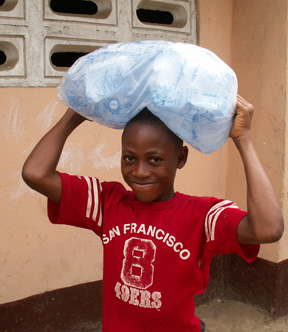 |
A small child carrying a large bag of sachet water (20 bags of 500 ml of water). |
Every refugee group is completely different, she said, and Americans cannot fathom the trauma and oppression they have experienced. “You don’t just let go of the horrors of war in a day or month or year,” she said.
Ford recently was named director of refugee initiatives for Unite for Sight and will assist with the coordination of refugee projects in Ghana, Sierra Leone, Sri Lanka and Nigeria. Later this month, (May 29), she will spend two weeks in Sierra Leone working with an NGO to assess the conditions and lay the groundwork for developing a sustained clinic and local Unite for Sight chapter. In July, she will do similar work at a camp in Sri Lanka with refugees from December’s tsunami.
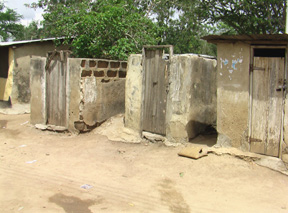 |
Pay toilets at the camp. |
The new refugee programs also concentrate on helping residents through training teachers and lay educators, providing coursework on epidemiology and relaying the importance of handwashing in decreasing disease transmission. While in Ghana, Ford’s team bought sewing machines for women who have started a microenterprise project http://www.uniteforsight.org/ordercase.php
UNMC recently formed its own Unite for Sight chapter, Ford said, which allows members to do eye education and screenings locally for the most vulnerable populations. UNMC medical student Christelle Akati leads the group and will travel to Togo on May 28 to run a short-term eye screening and referral program. Vakara Meyer and Cassandra Cash are going to Uganda this summer through the Uganda Village Program. All three recently completed their first year of medical school.
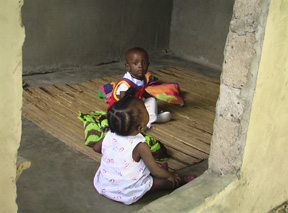 |
A mat often is the only furniture inside the house. |
The local Unite for Sight chapter continues to collect eyeglasses (they prefer simple readers, bifocals with simple prescriptions and sunglasses) for the refugee populations. Donations, including monetary donations, may be sent to UNMC’s Community and Multicultural Affairs at ZIP 4040. Anyone interested in learning more about the group, should contact Akati via e-mail at cakati@unmc.edu or Stephen McNeil at 559-9660.
In addition to Akati, officers for UNMC’s Unite for Sight chapter include UNMC students Sahra Niazi, vice president; Cassandra Cash, public relations officer; Stpehanie Ramm, treasurer; and Lizabeth Larson, vice president of vision screening and director of eyeglass drive.